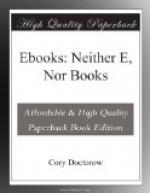You don’t get far in the arts without healthy doses of both ego and insecurity, and the downside of being able to google up all the things that people are saying about your book is that it can play right into your insecurities — “all these people will have it in their minds not to bother with my book because they’ve read the negative interweb reviews!” But the flipside of that is the ego: “If only they’d give it a shot, they’d see how good it is.” And the more scathing the review is, the more likely they are to give it a shot. Any press is good press, so long as they spell your URL right (and even if they spell your name wrong!).
5. Ebooks need to embrace their nature. [Ebooks need to embrace their nature.] The distinctive value of ebooks is orthagonal to the value of paper books, and it revolves around the mix-ability and send-ability of electronic text. The more you constrain an ebook’s distinctive value propositions — that is, the more you restrict a reader’s ability to copy, transport or transform an ebook — the more it has to be valued on the same axes as a paper-book. Ebooks fail on those axes. Ebooks don’t beat paper-books for sophisticated typography, they can’t match them for quality of paper or the smell of the glue. But just try sending a paper book to a friend in Brazil, for free, in less than a second. Or loading a thousand paper books into a little stick of flash-memory dangling from your keychain. Or searching a paper book for every instance of a character’s name to find a beloved passage. Hell, try clipping a pithy passage out of a paper book and pasting it into your sig-file.
6. Ebooks demand a different attention span (but not a shorter one). [Ebooks demand a different attention span (but not a shorter one).] Artists are always disappointed by their audience’s attention-spans. Go back far enough and you’ll find cuneiform etchings bemoaning the current Sumerian go-go lifestyle with its insistence on myths with plotlines and characters and action, not like we had in the old days. As artists, it would be a hell of a lot easier if our audiences were more tolerant of our penchant for boring them. We’d get to explore a lot more ideas without worrying about tarting them up with easy-to-swallow chocolate coatings of entertainment. We like to think of shortened attention spans as a product of the information age, but check this out:
[Nietzsche quote]
> To be sure one thing necessary above all: if one is to > practice reading as an art in this way, something > needs to be un-learned most thoroughly in these days.
In other words, if my book is too boring, it’s because you’re not paying enough attention. Writers say this stuff all the time, but this quote isn’t from this century or the last. [Nietzsche quote with attribution] It’s from the preface to Nietzsche’s “Genealogy of Morals,” published in 1887.




